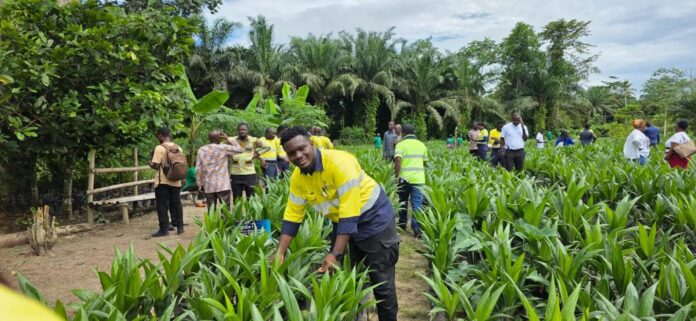By Ghana News Juliet Aguiar Dugbartey
By Juliet Aguiar DUGBARTEY, Pepesa
Gold Fields Ghana Foundation has taken a strategic step in driving agricultural entrepreneurship and community empowerment by establishing Eco Palms GH, a community-owned oil palm seedling production enterprise.
The initiative is part of the foundation’s long-term effort to promote sustainable livelihoods in host communities and reduce dependency on high-risk activities such as illegal mining.
At the launch of Eco Palms GH at Pepesa in the Prestea Huni-Valley Municipality in the Western Region, Executive Secretary of the Foundation, Abdel Razak Yakubu, explained that the idea was sparked by a practical challenge. For years, Gold Fields has been promoting oil palm farming in its host communities but relied on far-off Kade in the Eastern Region for seedlings.
“The distance, high cost and risk to seedling quality led the foundation to ask a pivotal question: Why not grow seedlings locally? With land support from the Pepesa community and technical assistance from the Prestea Huni Valley Municipal Assembly’s Business Resource Centre, 18 local residents made of 15 women and three men were trained and organised into what is now Eco Palms GH,” he added.
Therefore, he said the foundation backed the initiative with a GH¢180,000 investment, covering land preparation, seed procurement, nursery set-up, training and business registration.
In less than a year, he pointed out the effort is already bearing fruit. Eco Palms GH has raised 24,000 oil palm seedlings; and the foundation is purchasing 23,000 of them at GH¢12 each, generating GH¢280,000 in revenue for the business. “This has translated into nearly GH¢100,000 in profit for the group in its first production cycle. If sold at market value of GH¢27, revenue would have more than doubled, pointing to strong long-term profitability,” he said.
He pointed out that the oil palm project aims to support 500 farmers across host communities over a three-year period.
Beyond the financial success, Mr. Yakubu emphasised the broader purpose of the project. “This is more than a seedling business. It is a model of economic empowerment, especially for women. It is a tool for community development. And most importantly, an alternative to illegal mining which has harmed our environment, our health and our future.”
He noted that Eco Palms GH is also exploring external markets for the remaining 1,000 seedlings, a step toward building independent commercial viability.
“This is a deliberate shift toward value-chain development at the community level. The model we’ve adopted allows beneficiaries to earn, reinvest and grow without external dependence in the long term,” he pointed out.
To build on this success, he said the foundation plans to replicate the model for cocoa seedling production in other host communities, marking a strategic expansion of its agriculture-based CSR portfolio.
Mr. Yakubu encouraged the youth in the Prestea Huni-Valley Municipality to actively participate in this venture.
Dr. Isaac Danso, Director of the Oil Palm Research Institute, the Council for Scientific and Industrial Research (CSIR), praised the initiative for its commitment to quality and industry standards.
“Eco Palms GH is producing certified hybrid seedlings from CSIR. These are true-to-type planting materials that will significantly improve yields when combined with good agronomic practices,” he said.
He further expressed CSIR’s willingness to partner Eco Palms GH through a Memorandum of Understanding (MoU) to extend access to the institute’s research, technologies and technical guidance.
“With collaboration, we believe this initiative can transform oil palm cultivation in Ghana and help bridge the country’s current production deficit,” Dr. Danso added.
Post Views: 843
